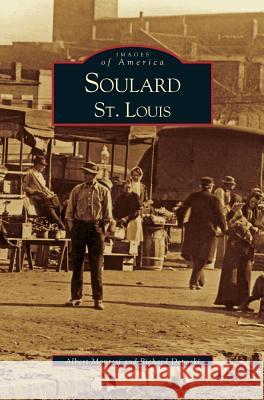Soulard St. Louis » książka
Soulard St. Louis
ISBN-13: 9781531604530 / Angielski / Twarda / 2000 / 130 str.
From its earliest days as Old Frenchtown, Soulard,
St. Louis, has embodied a bold and colorful tapestry of
immigrant life in America. With remarkable depth, authors
Montesi and Deposki have detailed the birth, destruction,
and final restoration of this historic area through over
200 photographs.
Bequeathed by the widow of surveyor Antoine Soulard
to the city of St. Louis in 1842, what was once a plot of
land intended for a vegetable market became a center of a
community of popular parks, breweries, churches, and shops.
Masses of Eastern European immigrants flocked to Soulard,
just outside downtown St. Louis, to start a new life of hope
and growth. German, Irish, Italian, and Czech influences can
be seen here in the images of the infamous "brew barons,"
horse-drawn market carts, and "flounder" houses that the
authors have reproduced with insightful captions. Captured
here in original photographs is the inescapable fury of the
Great Cyclone of 1896 that destroyed the area but not its
clenched-fist determination to survive. Montesi and Deposki
take us on a heroic journey through the annals of time to
discover the tenacious heart of a neighborhood now known
as St. Louis' most popular venue for jazz and blues
From its earliest days as Old Frenchtown, Soulard,
St. Louis, has embodied a bold and colorful tapestry of
immigrant life in America. With remarkable depth, authors
Montesi and Deposki have detailed the birth, destruction,
and final restoration of this historic area through over
200 photographs.
Bequeathed by the widow of surveyor Antoine Soulard
to the city of St. Louis in 1842, what was once a plot of
land intended for a vegetable market became a center of a
community of popular parks, breweries, churches, and shops.
Masses of Eastern European immigrants flocked to Soulard,
just outside downtown St. Louis, to start a new life of hope
and growth. German, Irish, Italian, and Czech influences can
be seen here in the images of the infamous "brew barons,"
horse-drawn market carts, and "flounder" houses that the
authors have reproduced with insightful captions. Captured
here in original photographs is the inescapable fury of the
Great Cyclone of 1896 that destroyed the area but not its
clenched-fist determination to survive. Montesi and Deposki
take us on a heroic journey through the annals of time to
discover the tenacious heart of a neighborhood now known
as St. Louis most popular venue for jazz and blues











